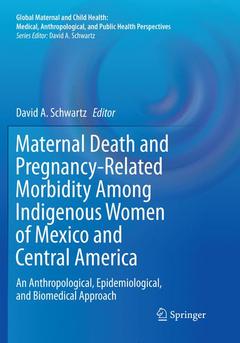Maternal Death and Pregnancy-Related Morbidity Among Indigenous Women of Mexico and Central America, Softcover reprint of the original 1st ed. 2018 An Anthropological, Epidemiological, and Biomedical Approach Global Maternal and Child Health Series

A sampling of the topics:
- Motherhood and modernization in a Yucatec village
- Maternal morbidity and mortality in Honduran Miskito communities
- Solitary birth and maternal mortality among the Rarámuri of Northern Mexico Maternal morbidity and mortality in the rural Trifino region of Guatemala
- The traditional Ngäbe-Buglé midwives of Panama
- Characterizations of maternal death among Mayan women in Yucatan, Mexico
- Unintended pregnancy, unsafe abortion, and unmet need in Guatemala
David Schwartz, MD, MS Hyg, FCAP, has an educational background in anthropology, medicine, public health, and epidemiology. He specializes in obstetrical and perinatal pathology and medical epidemiology, and has a professional interest in reproductive health, maternal disease, and maternal death in both resource-rich and resource-poor countries. Dr. Schwartz has organized and directed large national and international investigations of women’s health, obstetrical disease, and perinatal pathology and epidemiology for many government agencies including the Centers for Disease Control and Prevention (CDC), National Institutes of Health (NIH), and U.S. Agency for International Development (USAID) and several foreign governments, and has consulted and taught in these specialties in resource-poor nations. He has conducted extensive research in obstetrical pathology, and has been the recipient of grants from the NIH, CDC, and the Pediatric AIDS Foundation. He has a new multi-authoredtextbook regarding maternal morbidity and mortality in developing nations that was published in October 2015, and was previously a co-editor of an award-winning 2-volume medical textbook on infectious and tropical diseases. He has authored 119 peer-reviewed articles as well as 47 chapters in his specialty areas in the peer-reviewed medical literature. Dr. Schwartz is an experienced editor, currently serving on the Editorial Boards of three major international journals, and as an associate editor for one of them. He has previously taught at several universities, and is currently clinical professor of Pathology at the Georgia Regents University-Medical College of Georgia. He is also a member of the Directors Council of the Penn Museum of Archaeology and Anthropology at the University of Pennsylvania in Philadelphia, where he additionally serves on the Scholarly Activities Committee.
Date de parution : 12-2018
Ouvrage de 790 p.
17.8x25.4 cm
Disponible chez l'éditeur (délai d'approvisionnement : 15 jours).
Prix indicatif 111,82 €
Ajouter au panierDate de parution : 06-2018
Ouvrage de 790 p.
17.8x25.4 cm
Disponible chez l'éditeur (délai d'approvisionnement : 15 jours).
Prix indicatif 210,99 €
Ajouter au panierThèmes de Maternal Death and Pregnancy-Related Morbidity Among... :
Mots-clés :
maternal morbidity and mortality; indigenous women's health; reproductive health; maternal health; pregnancy complications; traditional birth attendants; skilled birth attendants; epidemiology; unsafe abortion; HIV/AIDS; obstetrical violence; teenage pregnancy; anthropology; global health; family planning; Mexico; Central America; midwifery and midwives; native women; biomedicine



